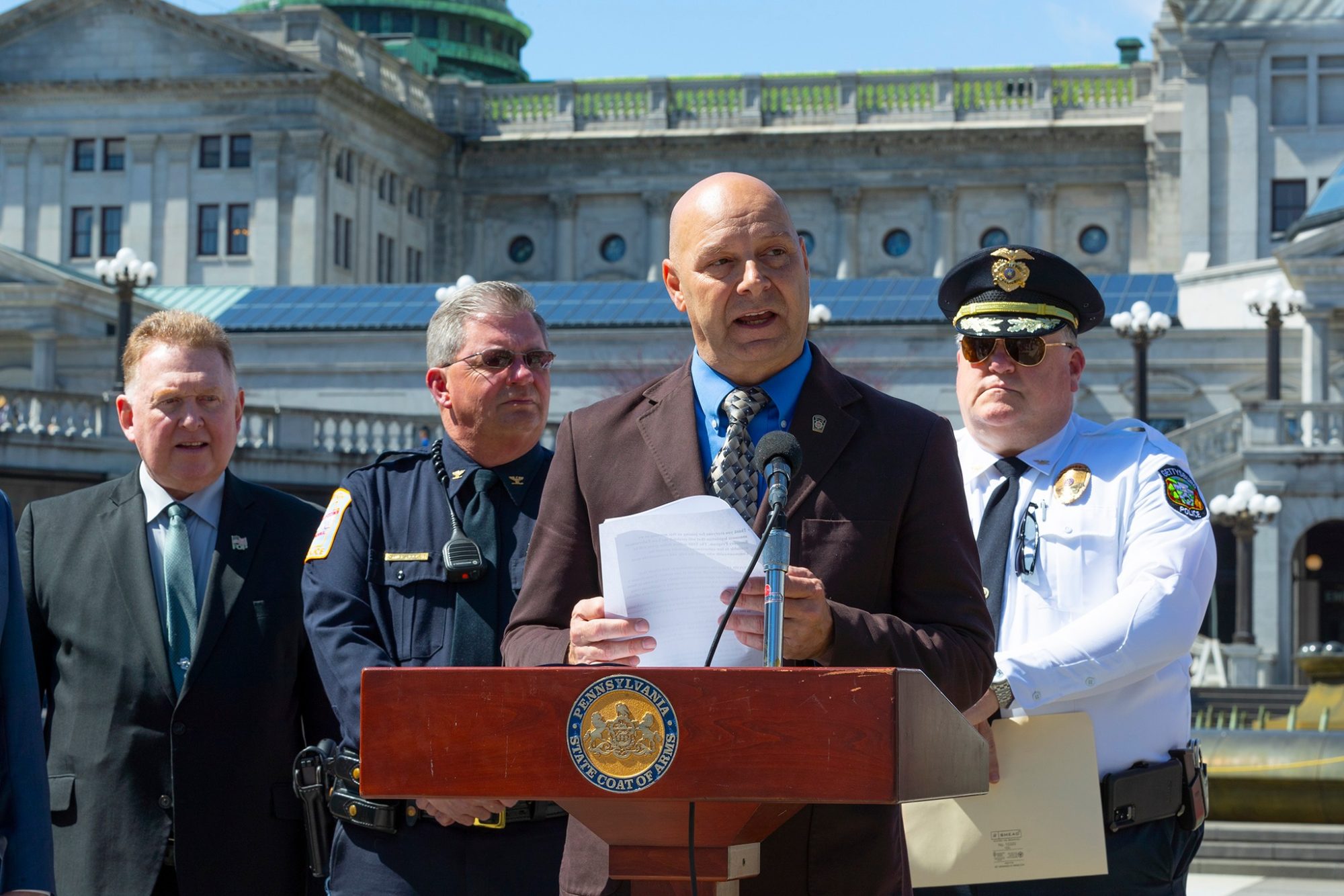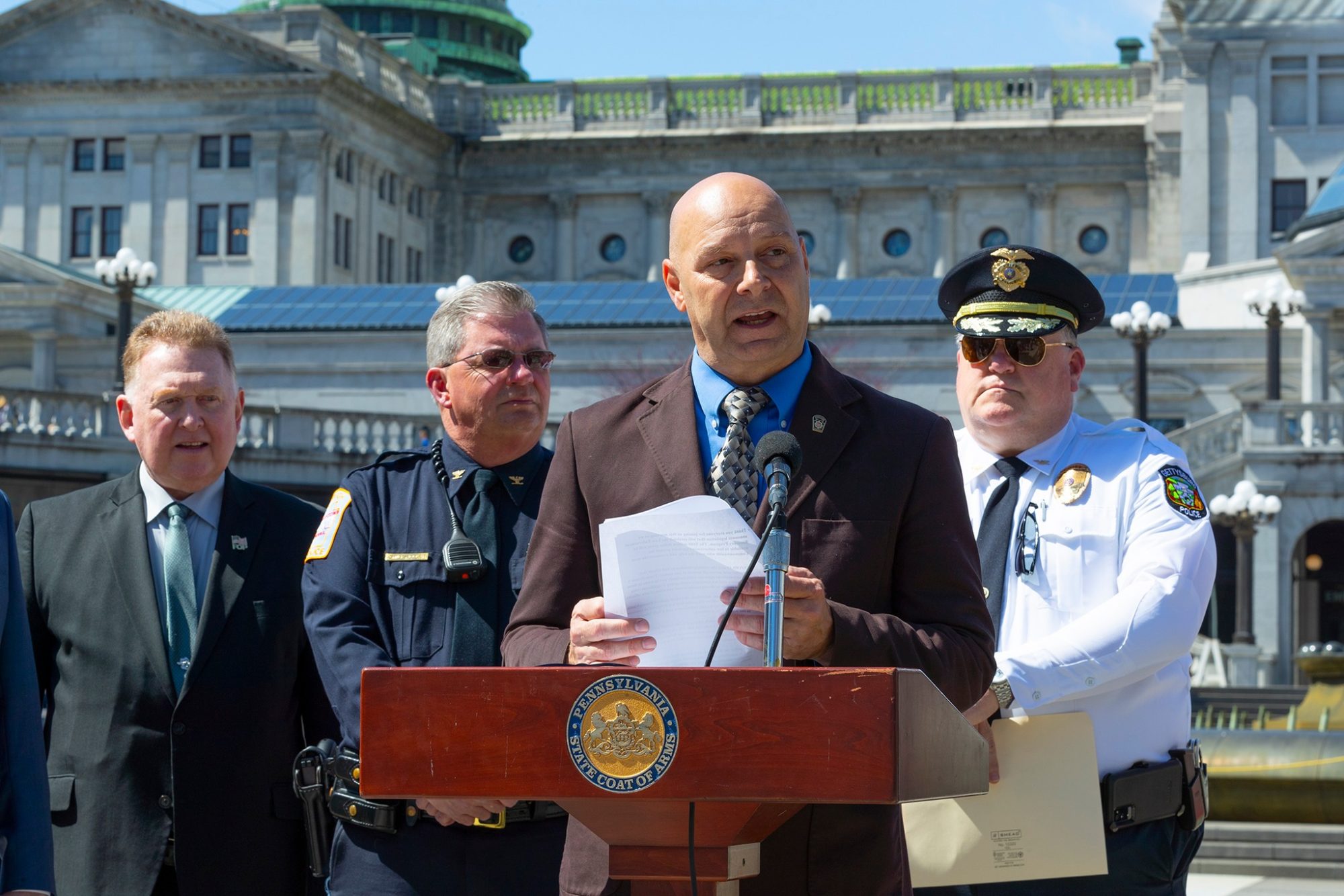Doug Mastriano Plans to Use His Secretary of State Pick to Disrupt Pennsylvania Elections
Secretaries of state have historically flown under the radar in Pennsylvania, but if Mastriano became governor, the election denier would appoint someone to the role who could try to block the certification of votes.
Jake Blumgart | August 15, 2022


Doug Mastriano is a Donald Trump loyalist, and an ardent proponent of the former president’s baseless conspiracies about the 2020 election. He was outside the capitol on Jan. 6th, brought supporters to D.C. that day, and has been subpoenaed by the congressional committee investigating the riots. Now, Mastriano is also the GOP nominee in Pennsylvania’s governor’s race in November. His victory would hand over control of a large swing state to a hard right election denier in the lead-up to the next presidential race.
“He has revealed the Deceit, Corruption, and outright Theft of the 2020 Presidential Election, and will do something about it,” Trump said of Mastriano when he endorsed him in May.
A centerpiece of Mastriano’s promise to revamp the state’s election system is to flex the governor’s authority to choose Pennsylvania’s secretary of state.
“As governor, I get to appoint the secretary of state. And I have a voting reform-minded individual who’s been traveling the nation and knows voting reform extremely well,” Mastriano told Steve Bannon, former chief strategist for Trump, in an April interview. “That individual has agreed to be my secretary of state.”
Mastriano rarely talks to the news media and mostly conducts interviews in far right venues, where his narrative about the 2020 election will not be questioned. As such, he has not publicly named the person he would name for secretary of state, though reporting from HuffPost and the Philadelphia Inquirer revealed some possible contenders among his like-minded allies. Mastriano’s campaign did not respond to an interview request for this article.
He has made it clear he would use many of the levers at his disposal to change rules he portrays as rife with corruption. “I saw better elections in Afghanistan than in Pennsylvania,” Mastriano, who spent much of his career in the U.S. Army, said during his campaign. He could work with the legislature, for instance, to pass new voting restrictions like rolling back mail-in voting or adopting harsh voter ID laws, measures he has promoted in the past. He has also proposed forcing voters to re-register and has said he could decertify all election machines in the state.
The ability to reshape the secretary of state position gives him more options than he might have in a state where the position is an elected office.
Historically, the secretary of state has been a relatively obscure role. The office shares power with local election officials in the 67 counties. It issues guidance and directives about how to run elections but mostly does not have the influence to mandate changes across the state (with some exceptions, like the office’s power over which voting machines are allowed). In statewide races, such as presidential or Senate contests, the secretary compiles the results from each county’s elections and certifies the winner. Ordinarily, this duty is a formality, leading to the role being jokingly referred to as “the mathematician-in-chief.”
But this isn’t an ordinary time. All over the nation, partisans of the former president are seeking to seize offices that run and certify elections, including secretary of state.
In this context, this normally anodyne appointment is raising concerns that the task of certifying Pennsylvania’s 2024 presidential contest could fall into the hands of someone who supports Trump’s efforts to overturn an election.
Most experts interviewed for this article had a hard time articulating what exactly a Mastriano governorship would look like because of how radical a break he is proposing with longstanding practices. But they warned that the threat of disruption would be high.
“Voting issues are front and center in this election…[which] I’ve never seen to this extent before,” said Cliff Levine, an election lawyer who largely works with Democratic candidates. A secretary of state appointed by Mastriano, Levine added, “could really create a fairly chaotic situation with our state election process.”
Election law in America is a patchwork. Each state has its own laws and a different take on the role of chief election officer. In the great majority of states, the secretary of state is an elected position. In 12, including Pennsylvania, it is an appointed position. .
“America is a confusing place when it comes to elections,” says Al Schmidt, president of the good government group the Committee of Seventy and former Republican city commissioner for Philadelphia. ‘We’re in Philadelphia, and New Jersey is across the river in one direction, and Delaware’s right next door. All three states run elections completely differently. Delaware runs elections centrally for the entire state. Whereas Pennsylvania runs it at the county level.”
It’s true that in Pennsylvania, county officials hold much of the responsibility for running elections. But the secretary of state position does wield a fair amount of soft power.
“The secretary of state has to oversee the election process, and has a lot of persuasive authority, but there’s always a little bit of tension in terms of how much authority the secretary will actually have,” says Levine.
A primary way the secretary of state wields power is through the issuance of directives. During the 2020 elections, for example, the Department of State issued numerous pieces of guidance around the interpretation of the recently passed Act 77, which allowed vote-by-mail statewide. The secretary of state gave county election boards direction on how to interpret the new law in the hopes of encouraging a degree of uniformity among the 67 counties. Should counties accept undated ballots, or those that came in without a secrecy envelope? What kind of security would be instituted around ballot drop boxes?
“The secretary of state plays a really important role in offering guidance,” says Levine. “A lot of times the courts are deferential to the guidance because they want to encourage uniformity, if possible.”
The Department of State’s influence with the judiciary is not ironclad, however. If a county’s conduct on these questions is challenged in court, judges will review the Department of State’s guidance. But they do not invariably give deference to the secretary’s opinion. In 2020, the courts accepted the agency’s guidance that naked ballots should be counted in that year’s primary election, but sided with GOP-ruled counties who sought to challenge their use in future.
The secretary of state can also choose to participate in defending challenges to election law. Under Democratic Governor Tom Wolf, the Department of State has weighed in to defend the existence of mail-in voting, for example, or against election deniers like Mastriano who seek to extra-legally examine voting machines.
A key element of the position that democracy watchers are interested in is the certification of voting machines. Pennsylvania’s 67 counties are each responsible for selecting their own voting systems. But they have to be approved by the Department of State to ensure the machines are reliable, accessible, and safe. The previous secretary of state, for example, decertified a variety of older machines in 2020 because they did not have a sufficient paper trail to meet cybersecurity standards.
Statutorily there is not a requirement that the secretary of state give a reason why they are decertifying election machines, and indeed there is not a lot of guidance on the necessary basis for such action. Mastriano’s proposal for decertifying all machines in the state is without parallel.
Lastly, the secretary of state gathers the election results from the counties and certifies them. This mostly just involves checking their math and, in statewide elections, tallying up all the votes to determine a winner, and approving them.
For Mastriano, it is that role in the certification process that may hold the most fascination. Trump and his allies in 2020 sought to disrupt the process of state officials finalizing the election results; in some states, they are still pushing for officials to decertify the last results. Experts fear that if someone like Mastriano was part of the process in 2024, they could try to abuse their power by trying to refuse election results from Democratically-leaning counties like Philadelphia or Pittsburgh’s Allegheny.
“This could get pretty hardcore if you’re an election denier,” says Levine. “If you think the election was stolen then you could be very aggressive in terms of not accepting certifications. That’s outside the normal perimeter of discretion.”
The secretary of state does not have the authority to outright reject local election results. There are built-in steps to challenge elections—-campaigns may seek to object to a particular county’s result, for instance—but the secretary isn’t meant to replace them. And such a scenario has never happened in living memory, but that doesn’t mean a committed ideologue in the role wouldn’t try it.
Trump allies are now routinely refusing to concede election losses. A New Mexico county commission in June refused to certify local results, though the state supreme court promptly stepped in to force them.
Any similar action by Pennsylvania’s secretary of state would be unprecedented and—in the eyes of many longtime observers—simply illegal. It would be sure to immediately wind up in court, and judges could intervene to compel the official to accept the results.
And a delayed certification could devolve into further chaos, said Rick Hasen, a professor at UCLA Law who specializes in election law.
“There would be an effort in Pennsylvania state courts to get the Secretary of State to follow the law,” Hasen told Bolts via email. “Likely the courts would order the Secretary to do so. But the governor or legislature could try to use the Secretary’s actions as a pretext to try to put in an alternative slate of electors to Congress.”
This would rehash the argument Trump’s lawyers made in 2020: that lawmakers should respond to uncertainty over results by appointing their own slate of electors. In this way, the secretary of state could set up an effort to tip Pennsylvania’s electoral votes in a different direction than the people’s choice.
“It would be uncertain and destabilizing,” Hasen said.
Even if such actions are struck down in court, a secretary of state devoted to the lie that Trump won the 2020 election could do irreparable damage to people’s confidence in democratic norms and the electoral system.
“Misinformation is a big and significant vulnerability,” says Schmidt, the former Republican commissioner, who declined to comment on the candidates but shared his ideal for the position should be. “The most important thing that the Department of State could do is to strengthen confidence in voting and in our participatory democracy and not discourage people, or confuse them.”


